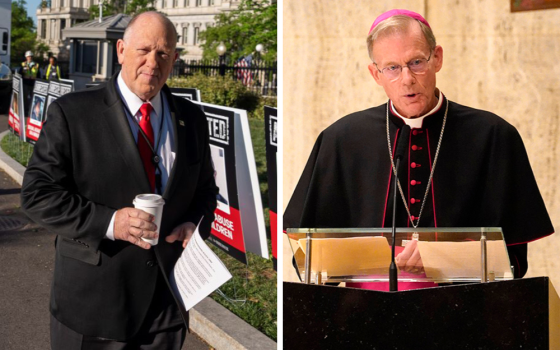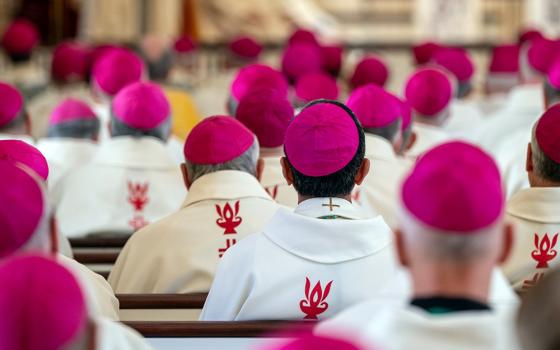Women religious look toward North Korea from Paju, South Korea, June 12, 2018. (CNS/Reuters/Kim Hong-Ji)
Catholic nuns from South Korea and Japan joined a regional meeting in Seoul where they decided to promote and work towards a "culture of listening, dialogue, discernment, care, and peace" in both nations.
The nuns made the decision during the Korea-Japan General Assembly of the International Union of Superiors General held at the National Reconciliation Center in Paju near Seoul from May 9 to 14.
The heads of 18 female religious orders in Korea and 10 religious orders in Japan attended the conference with the theme "Embracing Vulnerability on the Synodal Journey."
During the concluding Mass, Bishop Peter Lee Ki-heon of Uijeongbu Diocese said that he believes the decision of the nuns can help resolve various regional issues between both nations.
"It is very meaningful for superiors from Korea and Japan to meet and share roles at a time when security risks in Asia, including Northeast Asia, are escalating and environmental crises are accelerating," Lee said.
He further added that "the longer we endure each other, the bigger the fruit will be, so I think the meeting of Korean and Japanese women religious superiors will also achieve great fruit in the future."
The prelate was pointing out the motto of the union which has 1,903 Superiors General worldwide organized within 36 regional constellations. Asia has 184 member congregations.
The union aims to "create ways for women religious to be in dialogue with one another, with the Church authorities and with global organizations."
Advertisement
The union traces its informal beginnings to an extraordinary meeting held under the patronage of Pope Pius XII in 1951. The organization that subsequently emerged was officially approved by the Vatican Council on its final day, Dec. 8, 1965.
The recently concluded meeting was a continuation of discussions on the topics taken up in the 22nd General Assembly of the union held in Rome last May.
The nuns also discussed ways to embrace vulnerability in the world and within the congregation and passed a resolution "to embrace the vulnerability of the world." The details of the resolution are unavailable.
An unnamed nun who participated in the conference pointed out that the meetings helped the delegates understand each other better.
"Through this time, the positive minds of the Japanese confreres and the apology and reconciliation for historical events softened the hearts that were struggling with Korea-Japan relations," she said.
The delegates also conducted an ecological pilgrimage to Odusan Observatory, Seosomun Shrine, Dora Observatory, Inter-Korean Immigration Office, and Dorasan Station as part of the meeting.
The meeting also decided to actively participate in the Laudato Si' seven-year journey and promised to actively participate in its implementation in their respective territories.
The nuns also decided to pray every day for peace in Korea and Japan.
Korea and Japan had bitter relations for decades due to Japan's colonial rule and atrocities in the Korean Peninsula that ended after World War II.
To improve bilateral relations, leaders from both nations came together in Seoul for their first summit in 12 years, in March.
South Korean President Yoon Suk Yeol took the first step by proposing a solution to an unresolved dispute dating back more than a century when some 780,000 Koreans toiled as forced laborers in mines and factories during Japan's 1910-1945 colonial occupation of the Korean peninsula.
In March, the South Korean government rolled out a plan to compensate the victims of forced wartime labor through funds collected with the help of a local foundation but without direct involvement from Japan.
Tokyo on the other hand insists a 1965 treaty — which saw the two countries restore diplomatic ties with a reparations package of about $800 million in grants and cheap loans — settled all claims between the two relating to the colonial period.
The plan has drawn strong protests from victims' groups, who want financial compensation and an apology directly from the Japanese companies involved.
Editor's note: This story is reprinted with permission from UCA News. It was written in partnership with the Catholic Times of Korea.






